
Much of the history of Algeria has taken place on the fertile coastal plain of North Africa, which is often called the Maghreb. North Africa served as a transit region for people moving towards Europe or the Middle East, thus, the region's inhabitants have been influenced by populations from other areas, including the Carthaginians, Romans, and Vandals. The region was conquered by the Muslims in the early 8th century AD, but broke off from the Umayyad Caliphate after the Berber Revolt of 740. During the Ottoman period, Algeria became an important state in the Mediterranean sea which led to many naval conflicts. The last significant events in the country's recent history have been the Algerian War and Algerian Civil War.
The History of Algeria from 1962 to 1999 includes the period starting with preparations for independence and the aftermath of the independence war with France in the 1960s to the Civil War and the 1999 presidential election.

Mohamed Boudiaf, also called Si Tayeb el Watani, was an Algerian political leader and one of the founders of the revolutionary National Liberation Front (FLN) that led the Algerian War of Independence (1954–1962). Boudiaf was exiled soon after Algerian independence, and did not go back to Algeria for 27 years. He returned in 1992 to accept a position of Chairman of the High Council of State, but was assassinated four months later.

The president of the People's Democratic Republic of Algeria is the head of state and chief executive of Algeria, as well as the commander-in-chief of the Algerian People's National Armed Forces.
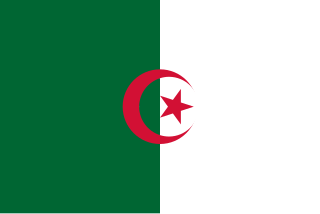
The National Liberation Front is a nationalist political party in Algeria. It was the principal nationalist movement during the Algerian War and the sole legal and ruling political party of the Algerian state until other parties were legalised in 1989. The FLN was established in 1954 from a split in the Movement for the Triumph of Democratic Liberties from members of the Special Organisation paramilitary; its armed wing, the National Liberation Army, participated in the Algerian War from 1954 to 1962. After the Évian Accords of 1962, the party purged internal dissent and ruled Algeria as a one-party state. After the 1988 October Riots and the Algerian Civil War (1991–2002) against Islamist groups, the FLN was reelected to power in the 2002 Algerian legislative election, and has generally remained in power ever since, although sometimes needing to form coalitions with other parties.

Ali Kafi was an Algerian politician who was Chairman of the High Council of State and acting President from 1992 to 1994.
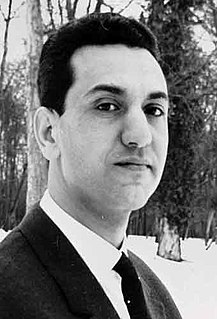
Hocine Aït Ahmed was an Algerian politician. He was founder and leader until 2009 of the historical political opposition in Algeria.
The Algerian Civil War was an armed conflict in Algeria between the Algerian Government and multiple Islamist rebel groups, sparked by a military overthrow of the newly elected Islamist government. The war lasted from December 1991 until February 2002, though in the south of the country an Islamist insurgency remains ongoing.
The Special Organisation was a secret paramilitary organisation in colonial Algeria, founded by Mohamed Belouizdad of the Movement for the Triumph of Democratic Liberties (MTLD) in 1947 to prepare for armed struggle against France, which ruled Algeria as a colony since 1830. The turn towards guerrilla warfare was in large part encouraged by the reactions to the Sétif massacre in 1945, and other examples of violent repression, which had convinced many Algerian activists that peaceful political work would be pointless.

Mohamed Boudiaf International Airport is an airport in Algeria, located approximately 9 kilometres (5.6 mi) south of Constantine; about 320 kilometres (200 mi) east-southeast of Algiers.

The Provisional Government of the Algerian Republic was the government-in-exile of the Algerian National Liberation Front (FLN) during the latter part of the Algerian War of Independence (1954–62).
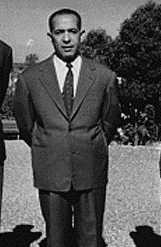
Mohamed Khider was an Algerian politician.
Lt. Gen. Mohamed Lamari was Chief of Staff of the Algerian army during most of the Algerian Civil War.
Major General Smain Lamari was the head of an Algerian intelligence service, the Department of Counter-Espionage and Internal Security. Along with Generals Mohamed Lamari, Khaled Nezzar, Larbi Belkheir and "Toufik" Médiène, he was one of the influential Algerian Generals. Lamari was close to Larbi Belkheir, now ambassador in Morocco. Lamari died from a heart attack, and was buried in the Cemetery El Alia reserved for high ranking Algerian officials, in the presence of President Abdelaziz Bouteflika.
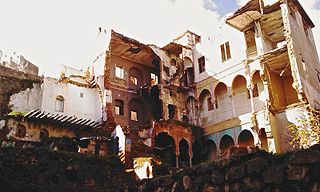
The Battle of Algiers was a campaign of urban guerrilla warfare carried out by the National Liberation Front (FLN) against the French Algerian authorities from late 1956 to late 1957. The conflict began with attacks by the FLN against the French forces followed by a terrorist attack on Algerian civilians in Algiers by a group of Pieds-Noirs, aided by the police. Reprisals followed and the violence escalated, leading the French Governor-General to deploy the French Army in Algiers to suppress the FLN. Civilian authorities gave full powers to General Jacques Massu who, operating outside legal frameworks between January and September 1957, eliminated the FLN from Algiers. The use of torture, forced disappearances and illegal executions by the French later caused controversy in France.
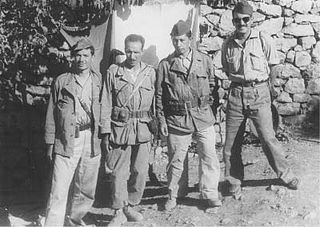
The Congress of Soummam was the founding act of the modern Algerian State, and a crucial element of success of the Algerian war for independence. It took place on 20 August 1956 when the FLN's leadership within Algeria met secretly in the Soummam valley to compose a common platform and create a new organizational structure.
Mohamed Boudiaf was killed by one of his own bodyguards, Lambarek Boumaarafi, presented officially as an Islamic fundamentalist, and a sympathiser of the Islamic Salvation Front (FIS), who acted alone. He was assassinated in Annaba while addressing a public meeting on June 29, 1992, which was later broadcast on national TV.
The Ad Hoc Inquiry Commission in Charge of the Question of Disappearances was a truth commission created in 2003 to investigate the forced disappearance of people during civil conflict. Its creation took place after the election of the current president, Abdelaziz Bouteflika, who then set up a National Human Rights Institution. Thereafter, the Commission was set up in order to give people the truth about what happened in the 1990s. However, its report was not made public and consequently, Algerians are not aware of the fate of their relatives.
The Declaration of 1 November 1954 is the first independentist appeal addressed by the National Liberation Front (FLN) to the Algerian people, marking the start of the Algerian Revolution and the armed action of the National Liberation Army (ALN).
Ahmed Mahsas was an Algerian militant in the nationalist movement against French Algeria.









